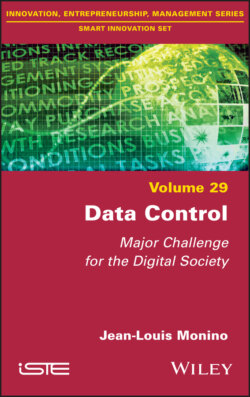Читать книгу Data Control - Jean-Louis Monino - Страница 16
1.2.2.1. Data
ОглавлениеFor a company, data are essential, and there are more and more concerning the environment in which it operates or will operate. We will no longer work on classes of behaviors, but on individual analysis. It is easy to understand that this revolution is leading to the creation of so-called “startup” companies whose aim would be to automatically process the wealth of data that make up what is known as “Big Data”. This is certainly one of the components of what some people call the new industrial revolution. The Internet, digital technology and connected objects have opened up new horizons in a multitude of fields.
As an example, access to data allows quantitative and qualitative analyses to be enriched. We can analyze customer contacts with data collected by a call center, as well as offer this kind of product in limited numbers as E2S-Conseils does. Indeed, the web offers immense information possibilities, Internet users demand clear, precise and immediate information. The responsiveness of the demand for information is a key point in this type of demand. Indeed, it is often necessary to wait to have a more than disappointing result. The start-up E2S-Conseils and the TRIS laboratory of the University of Montpellier are developing an innovative service based on a community platform to buy and sell multi-product and multi-country contacts and appointments.
According to Taylor, the value of information begins with a piece of data, which acquires value as it evolves, to achieve the objective and specify an action for decision-making. Information is a message with a higher level of meaning. It is a raw data that the subject then transforms into knowledge through a cognitive or intellectual operation.
Companies are very aware of the importance of knowledge and even more so of how to “manage”, enrich and benefit from it. Beyond all the factors (financial, technical and other), the knowledge that the company possesses also represents an important survival factor. Whether it is market knowledge, legal, technological, normative or other information.
This implies that in the information cycle, the data collected should be optimized so that needs are identified instantly and processed as quickly as possible. This will highlight the interaction between a multitude of actors (decision-makers, analysts, advisers, technicians, etc.) within the framework of a group dynamic and will allow the complementarity of knowledge, to improve understanding, analysis of situations, and production of information necessary for action. Indeed, “The quality of the production of knowledge for operational purposes depends on the skills of interpretation and analysis of the human factor in collective problem-solving situations” (Bulinge 2006, 2007).
